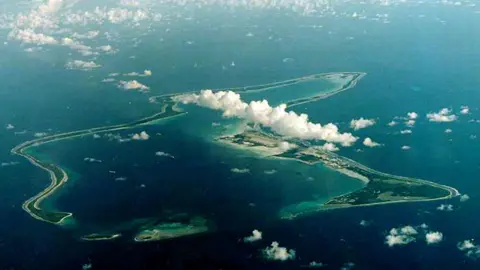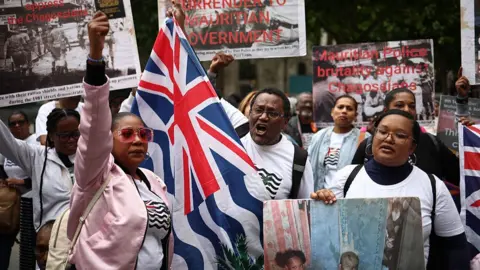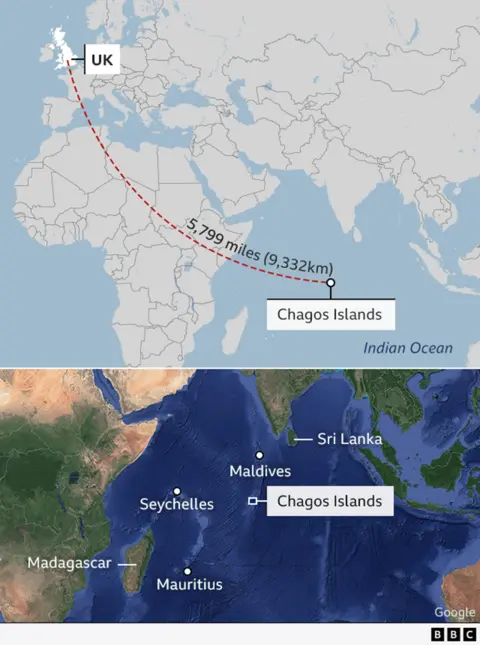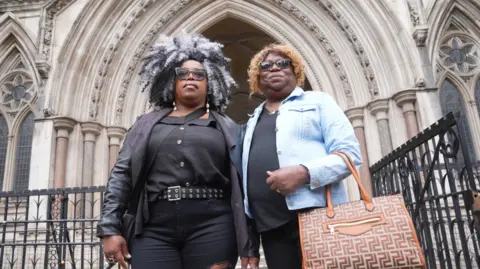Political reporter
BBC News
 Reuters
ReutersA deal that would see the UK hand the Chagos Islands to Mauritius can go ahead, the High Court has said, after lifting a temporary block on the agreement.
Prime Minister Sir Keir Starmer had been due to sign the deal at a virtual ceremony with Mauritian government representatives on Thursday.
In a last-minute court injunction, issued at 02:25 BST, a High Court judge temporarily halted the deal until a further court order.
However, at a fresh hearing the judge Mr Justice Chamberlain said the injunction should be discharged, clearing the way for the deal to be signed.
A UK government spokesperson welcomed the ruling, saying the agreement is “vital to protect the British people and our national security.”
The deal would see the UK give sovereignty of the Chagos Islands to Mauritius, but allow the UK and US to continue using a military base located on the Indian Ocean archipelago for an initial period of 99 years.
The UK government is yet to set out the estimated payments the British taxpayer would make to Mauritius as part of the deal, but it is expected to run into the billions.
Defence Secretary John Healey is due to make a statement in Parliament on the future of the military base later.
The deal has attracted strong criticism from opposition politicians in the UK, who have questioned the cost and say an important military base should not be given to a country with close links to China.
Conservative leader Kemi Badenoch said the deal was an example of “Labour chaos”.
“We should not be paying to surrender British territory to Mauritius,” she said.
“The fact that Labour is negotiating something that sees the British taxpayer in hoc for potential billions is completely wrong.”
Reform UK deputy leader Richard Tice joined a group of Chagossians outside the High Court, saying he wanted to see “another Starmer surrender sell out” stopped.
However, the Labour government has argued that ongoing questions about the UK’s right to keep the islands poses a risk to the future of the US-UK military base.
The legal action was brought by two Chagossian women, Bernadette Dugasse and Bertrice Pompe, who were both born on Diego Garcia, the largest of the islands, and would like to be able to return.
In October, the two countries said that under the deal Mauritius would be “free to implement a programme of resettlement” on the islands, excluding Diego Garcia, which is home to the UK-US military base.
In a pre-action letter, lawyers for the two women said the Chagossian people have unlawfully not been given a say in the future of the islands, despite being the native inhabitants.
They also said that they did not trust Mauritius to treat the Chagossians fairly, and that they would face “severe obstacles” as British citizens who do not hold Mauritian nationality, including possible racial discrimination and the loss of the possibility of returning.
Dismissing the injunction, Mr Justice Chamberlain said “the public interest and the interests of the United Kingdom would be substantially prejudiced” by a continued block on the deal.
He also dismissed an application to pause the deal to allow the claimants to take their case to the Court of Appeal.
Following the court’s decision, Ms Pompe said it was “a very very sad day” but added: “We are not giving up.”
 Getty Images
Getty ImagesOn Thursday, representatives of the Chagossian community met Foreign Office Secretary David Lammy and minister Stephen Doughty, for discussions on the sovereignty of the territory.
In a call immediately after the meeting, Jemmy Simon, from the Chagossian Voices group, told the BBC there was “nothing in there [the deal] that is any good for us”.
“I’m beyond horrified and angry right now.”
She said the deal would include a £40m support package, which the Mauritian government could use to help resettlement.
“They [the British government] promised to look out for our best interests – absolute rubbish,” she said.
“It is up to Mauritius to decide if we will get to resettle on the outer islands or not, but they don’t have to if they don’t want to.”
She added: “We want an iron-clad assurance that the Mauritian government will be held accountable and so will the UK government for making sure that we do end up with some sort of a decent life, that reparations are made.”

The Chagos Archipelago was separated from Mauritius in 1965, when Mauritius was still a British colony.
Britain purchased the islands for £3m, but Mauritius has argued it was illegally forced to give away the islands in order to get independence from Britain.
In the late 1960s Britain invited the US to build a military base on Diego Garcia and removed thousands of people from their homes on the island.
An immigration order, issued in 1971, prevented the islanders from returning.
The Chagos islanders themselves – some in Mauritius and the Seychelles, but others living in Crawley in Sussex – do not speak with one voice on the fate of their homeland.
Some are determined to return to live on the isolated islands, some are more focused on their rights and status in the UK, while others argue that the archipelago’s status should not be resolved by outsiders.
 PA
PAIn recent years, the UK has come under growing international pressure to return the islands to Mauritius, with both the United Nations’ top court and general assembly siding with Mauritius over sovereignty claims.
In late 2022, the previous Conservative government began negotiations over control of the territory but did not reach an agreement by the time it lost power in the 2024 general election.

